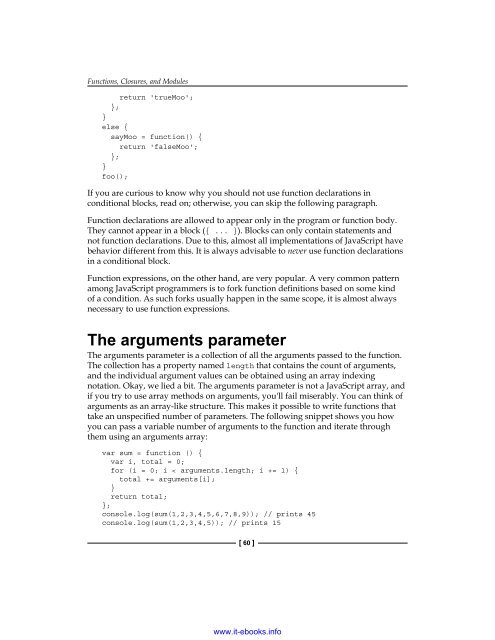You also want an ePaper? Increase the reach of your titles
YUMPU automatically turns print PDFs into web optimized ePapers that Google loves.
Functions, Closures, and Modules<br />
return 'trueMoo';<br />
};<br />
}<br />
else {<br />
sayMoo = function() {<br />
return 'falseMoo';<br />
};<br />
}<br />
foo();<br />
If you are curious to know why you should not use function declarations in<br />
conditional blocks, read on; otherwise, you can skip the following paragraph.<br />
Function declarations are allowed to appear only in the program or function body.<br />
They cannot appear in a block ({ ... }). Blocks can only contain statements and<br />
not function declarations. Due to this, almost all implementations of <strong>JavaScript</strong> have<br />
behavior different from this. It is always advisable to never use function declarations<br />
in a conditional block.<br />
Function expressions, on the other hand, are very popular. A very common pattern<br />
among <strong>JavaScript</strong> programmers is to fork function definitions based on some kind<br />
of a condition. As such forks usually happen in the same scope, it is almost always<br />
necessary to use function expressions.<br />
The arguments parameter<br />
The arguments parameter is a collection of all the arguments passed to the function.<br />
The collection has a property named length that contains the count of arguments,<br />
and the individual argument values can be obtained using an array indexing<br />
notation. Okay, we lied a bit. The arguments parameter is not a <strong>JavaScript</strong> array, and<br />
if you try to use array methods on arguments, you'll fail miserably. You can think of<br />
arguments as an array-like structure. This makes it possible to write functions that<br />
take an unspecified number of parameters. The following snippet shows you how<br />
you can pass a variable number of arguments to the function and iterate through<br />
them using an arguments array:<br />
var sum = function () {<br />
var i, total = 0;<br />
for (i = 0; i < arguments.length; i += 1) {<br />
total += arguments[i];<br />
}<br />
return total;<br />
};<br />
console.log(sum(1,2,3,4,5,6,7,8,9)); // prints 45<br />
console.log(sum(1,2,3,4,5)); // prints 15<br />
[ 60 ]<br />
www.it-ebooks.info


